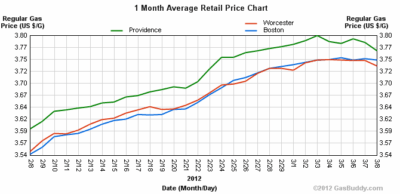Advertisement
No Relief In Sight For Rising Gas Prices
Resume
BOSTON — After a month of climbing, gas prices in Massachusetts have dipped down slightly. Economists say it’s only temporary. Their estimates put the price of gasoline above $4 per gallon by Memorial Day and the summer driving season.
The other day, Kathy Rush drove her daughter from her home in Boston to South Attleboro.
"And I put $20 in the car, and I had a quarter of tank and it went up to three quarters of a tank. And by the time I got home, it was back to a quarter of a tank," Rush said. "So it cost me $20 to go to South Attleboro and back."
But economist Chris Christopher would tell Rush she’s overreacting.
"Gasoline prices have a much larger impact psychologically on consumers than it actually has on people’s wallets," Christopher said.
Christopher studies fuel prices for the market research firm IHS Global Insight in Lexington. He says the fact that gas stations advertise their prices in big numbers on tall signs means you notice those price changes much more.
"Gasoline expenditures have undue influence on the consumer psyche," Christopher said. "And because of that, consumers feel very nervous and they might pull back spending a bit on other, more discretionary items."
That, he says, is the real threat from gas prices eclipsing $4 per gallon. People won’t want to spend as much elsewhere. And that means small businesses that are seeing their fuel costs go up will have a hard time passing on those costs to customers.
Charlotte Ploss, a longtime employee of Brookline Ice and Coal, a small ice delivery company, says managers have been debating how much more to charge to cover rising diesel costs.
"There are some prices that are going to have to go up for our customers," Ploss said. "But honest to goodness, pennies. We’re really looking at how many pennies per bag can we raise."
Ironically, even the price of those bags has been going up because petroleum is a big part of plastic production. But the major expense is those big diesel trucks hauling ice and burning fuel to keep it cold. Ploss says she faces the choice between raising prices and turning away customers.
"I had a call from someone who wants a lot of ice, right on one of the border towns in New Hampshire," Ploss said. "Last year, I would have said sure! This year, I’m thinking about it."
Some businesses are better-positioned. Area car dealerships report that sales of high-mileage vehicles are picking up. Discount warehouse stores that offer gas have been making up for low margins on the fuel by coaxing customers inside.
But for most businesses, it’s a worry. And there’s little coming down the pike that promises a break in gas costs. On Thursday the U.S. Senate narrowly rejected approving a pipeline to bring Canadian petroleum to American refineries. Sen. Scott Brown voted for it — he’s in favor of boosting the oil supply to bring costs down.
"The Keystone pipeline, another tool in the toolbox, not the whole answer," Brown said. "Certainly an opportunity to get more oil on the world market to help."
Meanwhile, the leading Democratic candidate vying for Brown’s seat, Elizabeth Warren, is blaming oil speculators for driving up prices at the pump.
Another factor that could hurt the supply and raise prices in New England: Some aging refineries on the East Coast are shutting down. Fortunately, the largest has an interested buyer.
Christopher says prices would have to rise a lot more to put a halt to economic growth in Massachusetts, but they could.
"Of course if anything changes dramatically for the worst in the Persian Gulf with Iran or some civil strife in Nigeria, then all bets are off," Christopher said. "That would deal a serious blow to this anemic economic recovery."
After all, one reason gas prices are up is that the economy is getting better and demand for gas is getting stronger. So the next time you see those tall signs with those big numbers, consider the alternative.
More:
This program aired on March 9, 2012.
